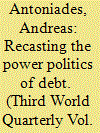| Srl | Item |
| 1 |
ID:
121756


|
|
|
|
|
| Publication |
2013.
|
| Summary/Abstract |
The 2007-08 financial crisis exposed and exacerbated the debt pathologies of the West. This paper examines whether the new global debt relations that have been generated by this crisis have transformed global power politics, changing the way in which the global South and the global North interrelate and interact. To do so the paper analyses the G20 advanced and emerging economies, examining a number of key indicators related to debt, indebtedness and financial leverage. This research leads to two main findings. First, the crisis has indeed given rise to new global debt relations. As a result, any reforms in the post-crisis global political economy will take place in an environment that favours the rising powers. Second, the USA maintains its capacity to control the parameters of this new global debt politics and economics, but cannot directly impose the terms of a solution to the existing 'global/hegemonic imbalances' on the rising powers.
|
|
|
|
|
|
|
|
|
|
|
|
|
|
|
|
| 2 |
ID:
083057


|
|
|
|
|
| Publication |
2008.
|
| Summary/Abstract |
This article claims that the European Union (EU) has had a very peculiar relationship with the globalized post-Cold War economic order. On the one hand, the EU was instrumental in bringing about this order. It aggressively promoted (both internally and externally) the principles and policies upon which this economic order has been based. On the other hand, this proactive engagement was translated within the EU into a highly polarized and antagonistic public discourse that led to a serious identity crisis. In this way, it is argued that economic globalization emerged in the EU as a debate on the nature and future of Europe. After 2005, this polarized and antagonistic discourse started to change. The rise of flexicurity, as a new way of thinking about Europe's place and orientation in the global political economy, has been instrumental in this shift. The article examines and evaluates these developments and their implications for the European project.
|
|
|
|
|
|
|
|
|
|
|
|
|
|
|
|